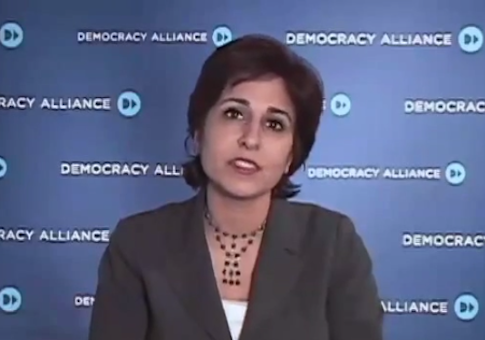The president of a leading liberal think tank took credit in 2012 for an Obama administration troop withdrawal plan in Iraq that has led to the de facto partition of the country and the near-collapse of its government as al Qaeda terrorists and Shiite militias run rampant.
Neera Tanden, president of the Center for American Progress, touted its cooperation with the White House on Iraq strategy in a 2012 pitch to members of the left-wing dark money group the Democracy Alliance.
The think tank did not respond to questions about whether it feels those initial recommendations were sound in light of the ongoing military campaign by the Islamic State in Iraq and the Levant (ISIL), which even Obama’s supporters say has been fueled by the president’s policies.
"We have in our short history affected impressive change, in my view, in healthcare, Iraq, energy policy," Tanden declared in a video pitch to Democracy Alliance donors obtained by the Washington Free Beacon. "We’ve not only put forward bold ideas to move the conversation, but we’ve worked with policymakers to adopt that progressive change when they are governing, and to actually help implement this legislation in a whole host of spheres."
"For example, in 2006, when no one in Washington was really talking about specific ways to end the war in Iraq, the Center for American Progress put forward a bold, specific plan to end the war," Tanden said. "A few short years later, Barack Obama, as president, helped end the war, and we’re seeing that important change now."
CAP’s withdrawal plan – which was actually released in 2005, not 2006, as Tanden said–called for the United States to "begin a slow and irreversible drawdown of military forces to make us safer by preserving our all-volunteer Army and refocusing all elements of American power on the real threats our country faces."
Shortly after CAP floated the plan, the administration of George W. Bush opted for a different strategy. Instead of withdrawing troops, the U.S. swelled its military force in Iraq by roughly 21,000.
That strategy was widely hailed as a success. Even Obama recognized its role in reducing sectarian violence in Iraq, according to Gen. David Petraeus, who commanded allied forces during the surge.
"The Middle East that Obama inherited in 2009 was largely at peace, for the surge in Iraq had beaten down the al Qaeda-linked groups," wrote Elliott Abrams, senior fellow at the Council on Foreign Relations and a former deputy national security adviser under Bush, in a Monday column in Politico.
CAP did not backtrack from its 2005 recommendations in a report this month detailing potential responses to increasing sectarian violence in Iraq.
"The withdrawal of U.S. combat troops was necessary to create an incentive for Iraqis to take control of their own affairs," three of the think tank’s scholars wrote. Their report blamed increasing violence on "the failure of Iraqi leaders, including Prime Minister Nouri al-Maliki, to build an inclusive political system."
CAP did not respond to questions about whether it would feature its Iraq recommendations in future pitches to the Democracy Alliance or other donors.
Tanden’s was one of 17 video pitches included in a promotional package for Democracy Alliance donors in 2012. The heads of various organizations supported by the Alliance each spent a few minutes detailing their latest organizational successes, and how the millions in dark money that flow through the Alliance every year could better support efforts to elect liberal politicians, push liberal policies, and build a political infrastructure to do both in the long term.
David Brock, founder of Media Matters for America, offered his organization’s unsuccessful campaign to rid the American airwaves of Rush Limbaugh after he called Democratic activist Sandra Fluke a "slut."
Brock detailed an extensive campaign of opposition research, media coordination, and political pressure designed to force Limbaugh off the air. Limbaugh has since maintained the highest talk radio ratings in the nation. Fluke came in second in a primary for a California state senate seat.
Critics have called Media Matters a de facto adjunct of Hillary Clinton’s 2016 presidential run, but Brock was careful to use language that couched the group’s efforts in nonpartisan terms.
However, other Democracy Alliance donor pitches were more explicitly political. Alliance founder Rob Stein in one video stressed the importance of "support for the Super PACs and our own paid advertising."
"Elections at every level–state legislative races, U.S. House and Senate races, the reelection of the president– particularly in battleground states, are likely to be decided by razor thin margins this year," Stein said. He implored donors to support the Alliance’s large network of electioneering organizations.
Stein was asking donors to support Built to Win, a collaborative effort of two Alliance-supported groups, the Committee on States and America Votes.
But Stein described a Democracy Alliance political apparatus that included a number of other prominent organizations.
The Alliance, America Votes, Catalist, State Voices, Progress Now, and other DA-supported groups "have been instrumental in pushing back against right-wing gubernatorial and legislative assaults," Stein said.
"We need to strengthen these programs so that they can deliver in 2012 and at the same time lay the foundation of the battles to come in 2013 and beyond."
